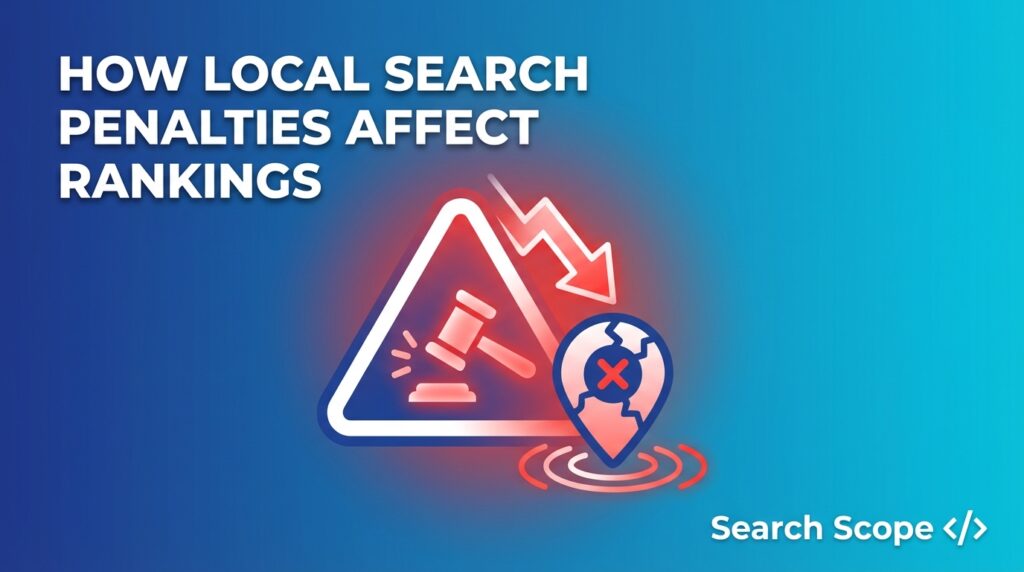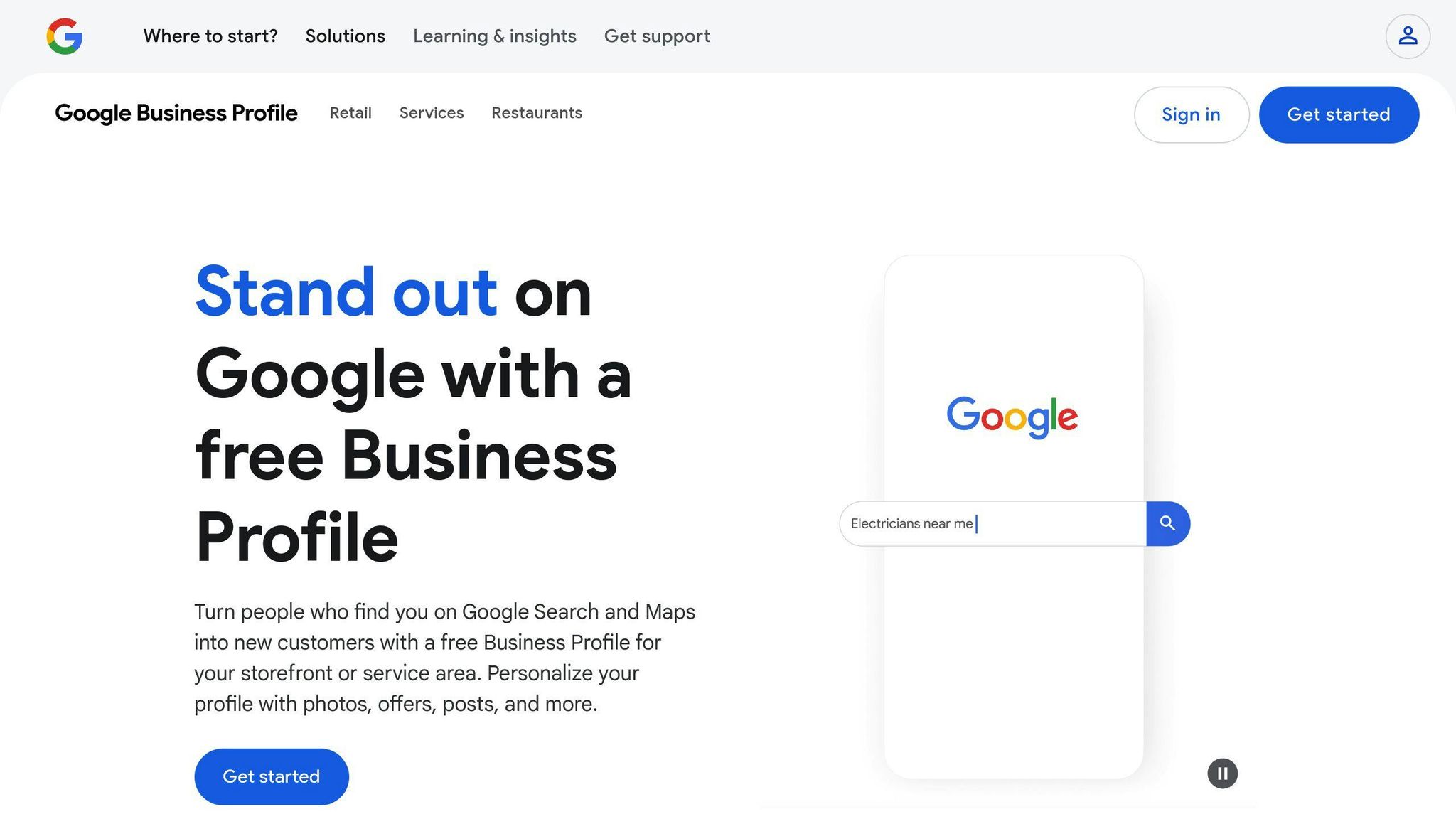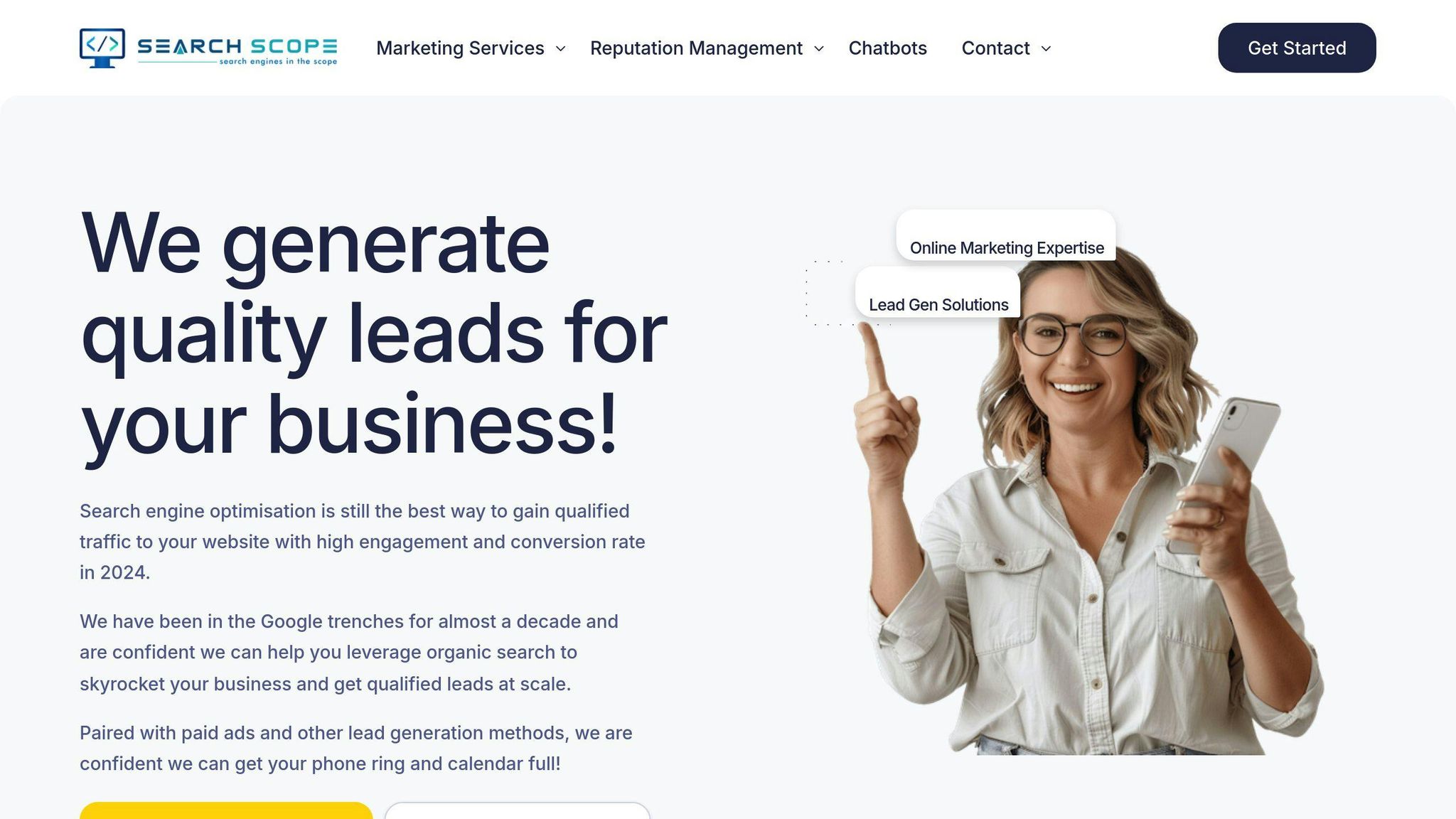How Local Search Penalties Affect Rankings

Last Updated on 12 January 2026 by Dorian Menard
As the founder of Search Scope, a Perth-based SEO agency, I’ve seen firsthand how local search penalties can damage a business. They can undo years of hard work by causing ranking drops, harming your visibility, and leading to a sharp decline in organic traffic.
These penalties happen when your business violates Google’s guidelines. Think of it as a response to tactics like keyword stuffing, getting fake reviews, or building unnatural backlinks.
Here’s what you need to know.
- Common Triggers: Keyword stuffing in your business name, duplicate Google Business Profile (GBP) listings, fake reviews, and low-quality content are frequent culprits.
- Impacts: The main effects are losing your spot in the local map pack rankings, a big drop in website traffic, and a loss of customer trust.
- Recovery Steps: The path back starts with a professional local SEO audit. You’ll also need to fix GBP issues, use Google’s Disavow Tool for bad links, and file a reconsideration request if you received a manual penalty.
- Prevention Tips: Stay current with Google’s guidelines. Keep your Name, Address, and Phone number (NAP) consistent everywhere online and focus on publishing high-quality, genuinely local content.
Recovering from a penalty takes time and a clear strategy. But with a proactive approach, you can protect your rankings for the long term.
How to Recover Your Business From Local Search Penalties
Getting hit with a penalty can feel like your business has vanished from the map overnight. But recovery is possible if you take methodical, deliberate steps to clean up the issues Google has flagged.
Common Causes of Local Search Penalties
Local search penalties often happen because of specific violations. Understanding these common triggers is the first step to avoiding a drop in your rankings and online visibility.
These penalties come in two forms. They can be manual, which is when a person on Google’s spam team applies them, or algorithmic, which are triggered automatically by updates like Google’s Penguin or Possum algorithms.
Violating Google’s Local SEO Guidelines
Breaking Google’s rules is the fastest way to get a penalty. Here are the most common violations I see with new clients.
| Violation Type | Description | Impact |
|---|---|---|
| Keyword Stuffing | Adding location terms to your business name, like “Bob’s Plumbing Perth & Fremantle.” | Immediate ranking drops or suspension. |
| Fake Reviews | Buying positive reviews or creating fake negative ones for competitors. | Profile suspension and loss of trust. |
| Inaccurate GBP Info | Listing an incorrect address, wrong phone number, or misleading business hours. | Reduced visibility and customer frustration. |
| Multiple Listings | Creating several Google Business Profiles for one actual business location. | Listings can be removed or penalised. |
Low-Quality Local Content
Content that doesn’t meet the needs of local users can also trigger a penalty. Google wants to see what it calls E-E-A-T, which stands for Experience, Expertise, Authoritativeness, and Trustworthiness.
Thin or unhelpful content signals the opposite.
- Thin or Duplicate Content: These are pages that offer little unique value about your local services or are copied from another source.
- Irrelevant Content: This is content that doesn’t match what local searchers are actually looking for.
- Poor User Experience: A slow, hard-to-navigate website is a major red flag for Google’s Core Web Vitals, which directly influence rankings.
Unnatural Link Practices
Aggressive or manipulative link building is a major problem. For example, a plumbing business that regained its rankings had to disavow 70% of its spammy backlinks that were targeting “Perth plumbers” keywords.
This shows just how risky these tactics can be.
- Building low-quality links from Private Blog Networks (PBNs) with city-specific anchor text.
- Paying for links from unrelated local business directories.
- Using automated link schemes that create artificial links from irrelevant local websites.
You need to stick to genuine strategies that prioritise user value. Regularly monitoring your practices and following Google’s guidelines is the only way to achieve steady, long-term growth.
Effects of Penalties on Rankings, Traffic, and Visibility
Penalties caused by issues like unnatural links or thin content can have a severe and immediate impact on a website’s performance.
Ranking Drops in Local Search
Local search penalties can seriously hurt your business online. They reduce your visibility in the local search results and on Google Maps, often pushing you from a top spot in the Local Pack to page 10 or beyond.
| Visibility Factor | Visibility Before Penalty | Impact After Penalty |
|---|---|---|
| Local Pack Presence | Top 3 “Map Pack” Results | Often completely removed. |
| Organic Rankings | First Page | Drops to page 10 or lower. |
| Map Visibility | Prominently visible in your service area. | Severely diminished or gone. |
| Click-Through Rate | Normal | Can see a reduction of over 90%. |
Reduced Organic Traffic
Penalties also cause an immediate and noticeable drop in real-world customer actions. A BrightLocal study found that businesses get an average of 1,009 customer searches each month via their Google Business Profile.
A penalty puts that traffic at risk.
- Website Visitors: A sharp decline in traffic coming from organic search.
- Phone Calls: Fewer enquiries from your Google Business Profile listing.
- Direction Requests: A big drop in navigation requests through Google Maps.
- Physical Visits: Fewer customers walking through your door.
Competitors Gaining an Edge
When your business loses visibility from a penalty, your competitors directly benefit. They absorb the traffic you lost, which strengthens their authority and improves their customer engagement.
This makes it even harder for your business to recover lost ground.
“The first page of search results captures about 92% of all search traffic, making it crucial for businesses to maintain high rankings”.
This is especially true in competitive local markets. Businesses with clean SEO practices are always quick to take advantage of the opportunity when a competitor disappears from the results.
sbb-itb-c74901f
Recovery Strategies for Local Search Penalties
Once you understand the effects of a local search penalty, it’s time to act. A clear recovery plan is the only way to regain lost rankings, rebuild trust, and stay competitive.
Conduct a Local SEO Audit
Start with a detailed local SEO audit to find the exact issues causing the penalty. You should first check Google Search Console for any manual action notifications from Google.
Then, use reliable SEO tools like Ahrefs, Semrush, or BrightLocal to examine these key areas.
| Audit Area | What to Check |
|---|---|
| Business Details | Consistency in Name, Address, and Phone number (NAP) across all citations. |
| Website Content | Duplicate pages, thin content, or keyword stuffing. |
| Link Profile | Harmful or spammy backlinks that need to be identified and disavowed. |
Update and Improve Your Google Business Profile

Your Google Business Profile is central to local search recovery. Double-check that your business name, address, and phone number are perfectly consistent everywhere online.
Choose the most accurate business categories, not the most numerous. You should also upload high-quality photos, respond to every customer review (good and bad), and use Google Posts to maintain an active presence.
Submit a Reconsideration Request
If you have a manual penalty, you must submit a reconsideration request through Google Search Console. This step is not for algorithmic penalties, as those lift automatically once you fix the issues.
In your request, clearly document all the updates you have made. Provide evidence that you now comply with Google’s rules and explain your plan to avoid future violations. This shows you are committed to following their guidelines.
If your entire profile was suspended, you will need to file a separate reinstatement request directly with the Google Business Profile support team.
Preventing Future Local Search Penalties
After you have dealt with an existing penalty, your next priority is to prevent it from happening again. Taking proactive steps will help you maintain your rankings and stay visible in local search results.
Stay Updated on Google’s Guidelines
Google’s guidelines change, so you need to stay informed. I recommend checking reliable sources like the official Google Search Central Blog or publications like Search Engine Land every month.
Pay special attention to these three areas.
| Focus Area | Key Monitoring Points | Prevention Strategy |
|---|---|---|
| NAP Consistency | Accurate business information. | Verify monthly across all major platforms. |
| Content Quality | Avoid duplicate or thin content. | Conduct a content audit every quarter. |
| Link Profile | Watch for unnatural backlinks from low-quality sites. | Perform a backlink analysis twice a year. |
Publish High-Quality, Localised Content
Creating content made specifically for your local audience is one of the best ways to avoid penalties. A plumbing company in Perth, for instance, saw a 40% increase in organic traffic by writing blog posts about plumbing issues caused by the local climate.
This approach builds authority and provides genuine value, which keeps them penalty-free.
Keep an Eye on Local SEO Performance
Tools like Google Search Console are your best resource for understanding how Google sees your site. It will show you performance data and alert you to technical problems.
“Google penalises websites that use manipulative tactics, making monitoring essential.”
Combine Search Console with Google Analytics to stay on top of your site’s health. Perform weekly traffic checks and set up alerts for any unusual drops in performance that could signal a penalty.
For extra security, you can work with local SEO professionals to protect your rankings.
Partnering with Experts for Local SEO Success
Search Scope: Local SEO Services

Search Scope is based in Western Australia, and we focus on helping businesses navigate the challenges of local search penalties. Our local SEO services are designed to produce measurable results.
| Service Area | What It Covers |
|---|---|
| Local SEO Audits | Detailed reviews to find technical issues and penalty triggers. |
| Google Maps SEO | Optimising your profile to boost local visibility in location-based searches. |
| Penalty Recovery | Strategic actions to restore rankings and ensure full compliance with Google’s guidelines. |
| Performance Monitoring | Ongoing tracking to prevent future issues and maintain positive momentum. |
Why Professional Help Matters
Recovering from local search penalties isn’t just about fixing mistakes, it’s about doing it the right way. An experienced agency can help you recover faster and avoid making costly errors in the future.
Here is how professional help makes a difference.
- Compliance Without Wasted Time: Experts already understand the complexities of Google’s guidelines, which saves you time and internal resources.
- Proven Recovery Strategies: We use proven techniques like link disavowal and content improvements to restore rankings effectively.
Professional agencies also simplify the process of submitting a reconsideration request. We conduct in-depth audits to find all the issues and prepare detailed documentation to support your request.
Our approach at Search Scope, particularly with our advanced audits and Google Maps SEO services, helps businesses recover and strengthen their local presence for the future.
Key Points on Local Search Penalties
Risks of Non-Compliance
Ignoring local search guidelines can severely harm your online presence. Penalties lead to ranking drops, reduced visibility, and less traffic, all of which directly affect your ability to attract local customers.
Here’s how that impact is typically felt.
| Impact Area | Consequence | Estimated Recovery Time |
|---|---|---|
| Rankings | Disappearing entirely from the local map pack. | 2-6 months after fixing all issues. |
| Visibility | No longer appearing on Google Maps for key searches. | 1-3 months after profile optimisation. |
| Traffic | A sharp decline in local leads and phone calls. | 3-4 months to regain previous momentum. |
Taking Action
Recovering from local search penalties requires a focused and proactive approach. Your business should prioritise these steps.
- Immediate Audits: Pinpoint penalty triggers and technical problems with a thorough assessment.
- Content Updates: Remove or fix problematic content and create high-quality, hyper-locally relevant content that matches what users are looking for.
- Technical Fixes: Resolve specific issues like disavowing harmful links or correcting NAP (Name, Address, Phone) inconsistencies.
Google’s algorithms are constantly getting better at spotting low-quality practices. By focusing on user-first content and sticking to Google’s rules, you can recover and build a stronger local search presence for long-term success.